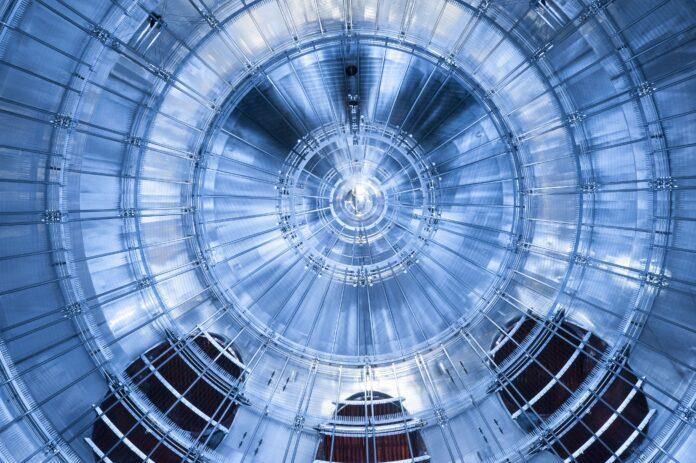KATRIN experiment mandated to weigh neutrinos has announced a more precise estimate of the upper limit of its mass – neutrinos weigh at most 0.8 eV, i.e., the neutrinos are lighter than 0.8 eV (1 eV = 1.782 x 10-36 kg).
Neutrinos (literally, the little neutral ones) are the most abundant elementary particles in the universe. They are almost omnipresent, in galaxy, in sun, in all the space around us. Trillions of neutrinos pass through our bodies every second without interacting with any other particle.
They were first formed 10-4 seconds after the big bang about 13.8 billion years ago and played an important role in the evolution of universe. They are continuously formed in huge amount in nuclear fusion reactions in the stars including in the sun, in the nuclear reactors on the earth and in radioactive decays. They are also important in the supernova process in a star’s life cycle and provide early signals of supernova explosions. At subatomic level, neutrinos provide a tool to study structure of nucleons. Neutrinos could also help explain matter-antimatter asymmetry.
All these importance notwithstanding, much is still unknown about neutrinos. We do not know how they interact with other particles. Similarly, since the discovery of neutrino oscillations, it is known that neutrinos have non-zero mass. We know that neutrinos have very small mass and are the lightest of all elementary particles but their exact mass still remains undetermined. For a better understanding of the universe, it is crucial that the mass of neutrinos is measured accurately.
The KArlsruhe TRItium Neutrino Experiment (KATRIN) at Karlsruhe Institute of Technology (KIT), the collaborative undertaking of six countries is dedicated to measurement of mass of neutrino with sub-eV precision.
In 2019, the KATRIN experiment had announced that neutrinos weigh at most 1.1 eV which was a two-fold improvement over previous upper-bound measurements of 2 eV
1 eV or electron volt is energy gained by an electron when the electrical potential at the electron increases by one volt and is equal to 1.602 × 10−19 joule. At subatomic level, it is convenient to express mass in terms of energy following mass-energy symmetry as per E=mc2 ; 1 eV = 1.782 x 10-36 kg.
On 14 February 2022, the KATRIN Collaboration announced measurement of mass of neutrinos with an unprecedented precision revealing neutrinos are lighter than 0.8 eV thus breaking the 1 eV barrier in neutrino physics.
The research team aims to continue with the further measurements of the neutrino mass till the end of 2024. From 2025, with the help of new TRISTAN detector system, the KATRIN experiment will embark on a search for sterile neutrinos. With masses in KeV range, sterile neutrinos would be candidates for the mysterious dark matter.
***
Sources:
- Karlsruhe Tritium Neutrino Experiment (KATRIN). Available at https://www.katrin.kit.edu/
- Karlsruhe Institute of Technology (KIT). Press Release 012/2022 – Neutrinos Are Lighter than 0.8 Electron Volts. Posted 14 February 2022. Available at https://www.kit.edu/kit/english/pi_2022_neutrinos-are-lighter-than-0-8-electron-volts.php
- The KATRIN Collaboration. Direct neutrino-mass measurement with sub-electronvolt sensitivity. Nat. Phys. 18, 160–166 (2022). Published: 14 February 2022. DOI: https://doi.org/10.1038/s41567-021-01463-1






































